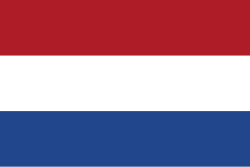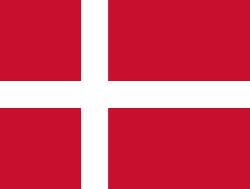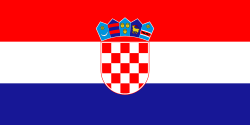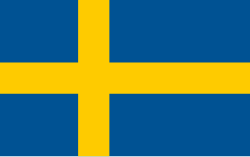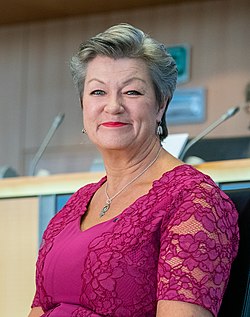Kommissionen von der Leyen I
| Kommissionen von der Leyen I Europeiska kommissionen | |
© European Union, 2025, CC BY 4.0 | |
| Tillträde | 1 december 2019 |
| Frånträde | 1 december 2024 |
| Sammansättning | |
| Kommissionsordförande | Ursula von der Leyen |
| Första vice ordförande | Maroš Šefčovič (2023–) Frans Timmermans (2019–2023) |
| Antal kommissionsledamöter | 27 |
| Parlamentariskt stöd i Europaparlamentet | |
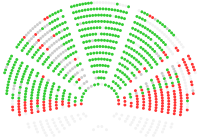 För (461) Emot (157) Avstod (89) | |
| Parlamentariskt stöd vid tillträdandet | EPP-gruppen S&D-gruppen Renew-gruppen ECR-gruppen (delvis) |
| Opposition | G/EFA-gruppen ID-gruppen GUE/NGL-gruppen |
| Historik | |
| Val | 2019 |
| Mandatperiod(er) | 2019–2024 |
| Företrädare | Kommissionen Juncker |
| Efterträdare | Kommissionen von der Leyen II |
Kommissionen von der Leyen I var en europeisk kommission som leddes av Ursula von der Leyen (EPP) mellan den 1 december 2019 och den 30 november 2024.
von der Leyen föreslogs som ny kommissionsordförande av Europeiska rådet den 2 juli 2019. Hon valdes till ny kommissionsordförande av en absolut majoritet i Europaparlamentet den 16 juli 2019.[1][2][3] De föreslagna kommissionsledamöterna genomgick utfrågningar och godkännande av parlamentet innan de gemensamt utsågs som ny kommission av Europeiska rådet i november 2019. Efter att ha utsetts av Europeiska rådet den 28 november 2019[4] kunde den nya kommissionen tillträda den 1 december 2019, en månad senare än det ursprungliga datumet då kommissionen Junckers mandatperiod skulle ta slut.[5][6]
Kommissionen von der Leyen I var den europeiska kommissionen med hittills jämnast könsfördelning bland ledamöterna. Kommissionen svor ed inför EU-domstolen den 13 januari 2020.[7]
Utnämning

För att bli kommissionsordförande var von der Leyen tvungen att erhålla en absolut majoritet i det nyvalda Europaparlamentet. De första veckorna i juli träffade hon de olika politiska grupperna i parlamentet för att diskutera sin kandidatur. EPP-gruppen ställde sig bakom hennes kandidatur trots att de tidigare krävt att Spitzenkandidat-systemet skulle följas. Den 9 juli 2019 mötte hon den konservativa ECR-gruppen.[8] Den 10 juli 2019 träffade von der Leyen de socialdemokratiska, liberala och gröna grupperna. Den gröna gruppen beslutade att inte stödja hennes kandidatur,[9] medan den socialdemokratiska respektive liberala gruppen uttryckte viss skepticism.[10] Renew-gruppen krävde till exempel att Ursula von der Leyen lovar tuffare tag för att säkerställa rättssäkerhet och demokrati i hela unionen samt att ALDE:s toppkandidat Margrethe Vestager ges samma tyngd i den nya kommissionen som socialdemokraternas Frans Timmermans.[11] Vänstergruppen GUE/NGL röstade emot henne.[12] För att bli vald av en absolut majoritet behövde von der Leyen stöd från åtminstone stora delar av EPP-, S&D-, ECR- och Renew-grupperna.[13][14] En omröstning hölls den 16 juli 2019,[15] efter att hon hade presenterat sitt politiska program.[16][17] I omröstningen fick hon 383 röster, vilket var tillräckligt för att uppnå absolut majoritet. Hon erhöll detta efter att ha lovat socialdemokratiska och liberala gruppen omfattande reformer, bland annat kring klimatpolitik, arbetsmarknadspolitik, säkerställandet av rättsstatens principer och jämställdhet.[18][19][20]
Den 10 september 2019 antog rådet den fullständiga förteckningen över föreslagna kommissionsledamöter.[21] Samtidigt annonserade von der Leyen den föreslagna ansvarsfördelningen i hennes förslag till kommission.[22] Totalt föreslogs 8 vice ordförande i kommissionen, varav tre "verkställande" med mer långtgående makt än övriga kommissionsledamöter. Medan de övriga vice ordförande koordinerar arbetet mellan kommissionsledamöterna, har de verkställande kommissionsledamöterna även ansvar för egna politikområden, såsom klimat- och konkurrensfrågor. Mot bakgrund av utfrågningarna i Europaparlamentet antog rådet den 25 november 2019 en uppdaterad lista över kommissionsledamöterna.[23]
Utfrågningar i Europaparlamentet


I slutet av september påbörjades Europaparlamentets utfrågningar av de föreslagna kandidaterna. Den 26 september 2019 röstade en majoritet i utskottet för rättsliga frågor emot den rumänska kandidaten Rovana Plumb och den ungerska kandidaten László Trócsányi.[24] von der Leyen uppmanade därefter regeringarna i Rumänien och Ungern att föreslå nya kandidater.[25][26] Övriga 24 kandidater godkändes, vilket innebar att de kunde gå vidare till utfrågningar i sina respektive sakutskott i parlamentet.[27]
Den 1 oktober 2019 nominerade den ungerska regeringen Ungerns EU-ambassadör Olivér Várhelyi som ny kandidat.[28] Rumäniens regering nominerade Dan Nica som ny kandidat,[29] men von der Leyen accepterade inte denna nominering. Den 10 oktober 2019 förlorade den rumänska regeringen en misstroendeomröstning i det rumänska parlamentet och det är därför oklart när en ersättare kan nomineras.
Den 10 oktober 2019 röstade Europaparlamentets ansvariga utskott även ner den franska kandidaten Sylvie Goulard, vilket tvingade Emmanuel Macron till att nominera en ny kandidat.[30][31]
Europaparlamentet godkände förslaget till kommission den 27 november 2019.[32][33]
Kommissionsledamöter
|
Nedan redovisas kommissionsledamöterna i kommissionen von der Leyen I.[34]
von der Leyen uppmanade de nationella regeringarna att nominera två kandidater, en man och en kvinna, så att en jämn könsfördelning skulle kunna uppnås. Endast Rumäniens regering gjorde dock det i slutändan. Däremot har ovanligt många regeringar nominerat kvinnliga kandidater, vilket innebär att kommissionen är den mest könsbalanserade någonsin.
Storbritanniens regering valde att inte nominera någon kommissionsledamot på grund av brexit och nyvalet i december 2019.[35][36] Eftersom det är en skyldighet för medlemsstaterna enligt EU-fördragen att föreslå kommissionsledamöter inledde kommissionen ett överträdelseförfarande mot Storbritannien i november 2019.[37]
I maj 2023 avgick Marija Gabriel som kommissionsledamot. Hon ersattes av Iliana Ivanova den 19 september 2023.[38][39][40]
I augusti 2023 avgick kommissionens förste vice ordförande Frans Timmermans efter att ha gett sig in i nederländsk nationell politik igen.[41][42] Han ersattes av Wopke Hoekstra den 9 oktober 2023.[43]
I juli 2024 avgick även Virginijus Sinkevičius och Adina Vălean för att bli ledamöter av Europaparlamentet efter valet 2024. Deras ansvarsområden övertogs tillfälligt av Maroš Šefčovič respektive Wopke Hoekstra.[44] Europeiska unionens råd beslutade den 24 juli 2024 att inte utse några ersättare för resterande delen av mandatperioden.[45] Den 16 september 2024 avgick även Thierry Breton och även i detta fall avstod rådet från att utse en ny ledamot.[46]
|
Organisation
Precis som tidigare kommissioner är kommissionen von der Leyen I organiserad i olika generaldirektorat. I samband med sitt tillträdande inrättade kommissionen von der Leyen I ett nytt generaldirektorat för försvarsindustri och rymdfrågor (DEFIS) och ett för stöd för strukturreformer (REFORM).[47]
Kommissionens politik
Europeiska gröna given
Ett av kommissionens prioriterade områden är vad den kallar den europeiska gröna given. Kommissionen har som ambition att unionens utsläpp av växthusgaser ska minska med 55 procent jämfört med 1990 års nivåer fram till 2030 och att Europa ska bli den första helt utsläppsneutrala kontinenten år 2050. Under 2021 antogs en europeisk klimatlag av Europaparlamentet och Europeiska unionens råd på förslag av kommissionen som fastställde dess mål.[48] I mitten av juli 2021 följdes detta av ett lagstiftningspaket – Fit for 55 – med olika lagförslag för att uppnå det första målet om en minskning av växthusgaser på 55 procent fram till 2030.
Digitalisering
Vid sidan av den gröna given är digitalisering bland kommissionens mest uttalade prioriterade områden.
Asylpolitik
Den 23 september 2020 presenterade kommissionen ett nytt förslag till asylpolitik. Förslaget går bland annat ut på att ersätta Dublinförordningen med ett nytt regelverk och att införa screening av alla som kommer till unionens yttre gräns utan att uppfylla inresevillkoren.
Coronaviruspandemin 2020–2021
Bara några månader in i sin mandatperiod tvingades kommissionen von der Leyen I ta itu med coronaviruspandemin. I mitten av mars 2020 la kommissionen fram en rad olika förslag för att dels säkerställa den fria rörligheten för varor på den inre marknaden, dels för att mildra konsekvenserna av coronaviruset. Bland annat vidtogs följande åtgärder:[49][50]
- Det gemensamma beredskapslagret rescEU utökades till att även innefatta medicinsk skyddsutrustning.[51][52]
- Mer generös tillämpning av stabilitets- och tillväxtpakten[53][54] och bestämmelserna om statsstöd[55][56]
- Investeringsinitiativet mot effekter av coronaviruset, ett investeringspaket på 37 miljarder euro. Förslaget godkändes av Europaparlamentet den 26 mars 2020 och Europeiska unionens råd den 30 mars 2020. Det trädde i kraft den 1 april 2020.[57]
- Förslag till ett nytt instrument, Europeiska instrumentet för tillfälligt stöd för att minska risken för arbetslöshet i en krissituation (SURE), för att med 100 miljarder euro ge lån för att stödja korttidsarbete[58][59][60][61][62]
- Utökande av Europeiska unionens solidaritetsfond till att även omfatta internationella hälsonödlägen och därmed aktivera 800 miljoner euro för stöd till utsatta medlemsstater. Förslaget godkändes av Europaparlamentet den 26 mars 2020 och rådet den 30 mars 2020. Det trädde i kraft den 1 april 2020.[63]
- Tillfälligt flexiblare regler för flygtrafik, så att flygbolag som ställer in flygturer till följd av lågt resandeunderlag inte riskerar att nedprioriteras vid fördelningen av ankomst- och avgångstider[64]. Förslaget godkändes av Europaparlamentet den 26 mars 2020 och av rådet den 30 mars 2020. Det trädde i kraft den 1 april 2020.[65]
- Gemensamma riktlinjer till medlemsstaterna kring bland annat gränskontroller, varuflöden och gränsöverskridande arbetskraft för att motverka timslånga köer vid medlemsstaternas gemensamma gränser.
- Ett allmänt inreseförbud till EU (utom Irland) och Schengenområdet för tredjelandsmedborgare, utom vissa specifika grupper.[66] Europeiska rådet ställde sig bakom förbudet den 17 mars 2020 och det infördes därefter av medlemsstaterna på nationell nivå för en period av 30 dagar. I början av april 2020 föreslog kommissionen att förbudet skulle förlängas,[67] vilket skedde fram till och med den 15 maj 2020.[68]
- Exportrestriktioner för medicinsk skyddsutrustning till tredjeland, dock ej EES-länderna, Schweiz samt de europeiska mikrostaterna[69][70] Samtidigt togs tull- och momsavgifter på varor för bekämpning av coronaviruset eller för användning i sjuk- och hälsovården tillfälligt bort.[71][72]
- Införandet av gröna körfält för att underlätta varutransporter genom de återinförda gränskontrollerna mellan EU-länderna[73]
- Ett återhämtningsinstrument på 750 miljarder euro och en ny flerårig budgetram med fokus på att stödja återhämtningen efter coronaviruspandemin genom investeringar i hållbarhet och digitalisering.
Kontakter med civilsamhället
Statistik från februari 2024 visade att Ursula von der Leyen hade haft 163 möten med olika organisationer som kommissionsordförande. Motsvarande siffra för Jean-Claude Juncker under hans femåriga mandatperiod som kommissionsordförande var 61. von der Leyen kritiserades dock för att ha haft en stor överrepresentation av möten med tyska företag, trots att ledamöter av kommissionen ska agera utifrån hela unionens intresse. Hon hade också haft en större andel möten med företag och en mindre andel möten med exempelvis icke-vinstdrivande organisationer än Juncker.[74]
Skandaler
Kommissionsledamoten Phil Hogan, som var ansvarig för handelsfrågor, tvingades lämna kommissionen i augusti 2020 efter att det framkommit i media att han deltagit i ett evenemang i Irland som bröt mot de rådande restriktionerna och rekommendationerna under coronakrisen.[75] Han ersattes av Mairead McGuinness, som tillträdde den 12 oktober 2020 efter att ha godkänts av Europaparlamentet.[76] Hon övertog ansvaret för finansmarknadsfrågor från Valdis Dombrovskis, som istället tog över handelsfrågorna som Hogan hade ansvarat för.
Se även
Referenser
- ^ [1]
- ^ [2]
- ^ [3]
- ^ [4]
- ^ ”New EU Commission delayed for at least a month” (på engelska). EurActiv.com. 17 oktober 2019. https://www.euractiv.com/section/eu-elections-2019/news/new-eu-commission-delayed-for-at-least-a-month/. Läst 17 oktober 2019.
- ^ ”Start of new European Commission likely delayed to December 1” (på engelska). Politico. 17 oktober 2019. https://www.politico.eu/article/european-commission-start-likely-delayed-to-december-1. Läst 17 oktober 2019.
- ^ [5]
- ^ [6]
- ^ [7]
- ^ [8]
- ^ [9]
- ^ [10]
- ^ [11]
- ^ [12]
- ^ [13]
- ^ [14]
- ^ [15]
- ^ [16]
- ^ [17]
- ^ [18]
- ^ [19]
- ^ [20]
- ^ [21]
- ^ [22]
- ^ [23]
- ^ [24]
- ^ [25]
- ^ [26]
- ^ [27]
- ^ [28]
- ^ [29]
- ^ [30]
- ^ [31]
- ^ [32]
- ^ [33]
- ^ [34]
- ^ [35]
- ^ [36]
- ^ [37]
- ^ [38]
- ^ [39]
- ^ [40]
- ^ [41]
- ^ [42]
- ^ [43]
- ^ [44]
- ^ ”Arkiverade kopian”. Arkiverad från originalet den 1 oktober 2019. https://web.archive.org/web/20191001204940/https://g8fip1kplyr33r3krz5b97d1-wpengine.netdna-ssl.com/wp-content/uploads/2019/09/VDL_chart_revise.pdf. Läst 1 oktober 2019.
- ^ [45]
- ^ Så jobbar EU med coronakrisen
- ^ Overview of the Commission’s response
- ^ [46]
- ^ [47]
- ^ [48]
- ^ Uttalande från EU-ländernas finansministrar om stabilitets- och tillväxtpakten och coronakrisen
- ^ MEDDELANDE FRÅN KOMMISSIONEN: Tillfällig ram för statliga stödåtgärder till stöd för ekonomin under det pågående utbrottet av covid-19
- ^ [49]
- ^ EUROPAPARLAMENTETS OCH RÅDETS FÖRORDNING (EU) 2020/460
- ^ [50]
- ^ [51]
- ^ [52]
- ^ [53]
- ^ [54]
- ^ EUROPAPARLAMENTETS OCH RÅDETS FÖRORDNING (EU) 2020/461
- ^ []
- ^ EUROPAPARLAMENTETS OCH RÅDETS FÖRORDNING (EU) 2020/459
- ^ [55]
- ^ [56]
- ^ [57]
- ^ [58]
- ^ [59]
- ^ [60]
- ^ EU waives customs duties, VAT on vital medical imports
- ^ [61]
- ^ [62]
- ^ [63]
- ^ [64]
| |||||||||||||||||
| EU-portalen – temasidan för Europeiska unionen på svenskspråkiga Wikipedia. |
Media som används på denna webbplats
The Flag of Europe is the flag and emblem of the European Union (EU) and Council of Europe (CoE). It consists of a circle of 12 golden (yellow) stars on a blue background. It was created in 1955 by the CoE and adopted by the EU, then the European Communities, in the 1980s.
The CoE and EU are distinct in membership and nature. The CoE is a 47-member international organisation dealing with human rights and rule of law, while the EU is a quasi-federal union of 27 states focused on economic integration and political cooperation. Today, the flag is mostly associated with the latter.
It was the intention of the CoE that the flag should come to represent Europe as a whole, and since its adoption the membership of the CoE covers nearly the entire continent. This is why the EU adopted the same flag. The flag has been used to represent Europe in sporting events and as a pro-democracy banner outside the Union.Det är enkelt att lägga till en ram runt den här bilden
Flag of Portugal, created by Columbano Bordalo Pinheiro (1857–1929), officially adopted by Portuguese government in June 30th 1911 (in use since about November 1910). Color shades matching the RGB values officially reccomended here. (PMS values should be used for direct ink or textile; CMYK for 4-color offset printing on paper; this is an image for screen display, RGB should be used.)
The civil ensign and flag of Belgium. It is identical to Image:Flag of Belgium.svg except that it has a 2:3 ratio, instead of 13:15.
The flag of Slovenia.
- "The construction sheet for the coat of arms and flag of the Republic of Slovenia
- is issued in the Official Gazette Uradni list Republike Slovenije #67, 27 October 1994
- as the addendum to the Law on the coat of arms and flag."
Författare/Upphovsman: European Parliament from EU, Licens: CC BY 2.0
Before the European Parliament can vote the new European Commission led by Ursula von der Leyen into office, parliamentary committees will assess the suitability of commissioners-designate.
On 23-26 May, more than 200,000,000 people in 28 EU countries went to the polls to elect members of the European Parliament, giving them a strong democratic mandate, including voting into office the new European Commission and examining the competencies and abilities of its commissioners-designate. Elected members of the European Parliament will also listen to their ideas and will assess their willingness to take concrete actions on the issues that Europeans care about.
Each candidate commissioner is invited for a live-streamed, three-hour hearing in front of the committee or committees responsible for their proposed portfolio. The hearings will take place between Monday 30 September and Tuesday 8 October.
<a href="http://epinsta.eu/EPhearings2019" rel="noreferrer nofollow">epinsta.eu/EPhearings2019</a>
This photo is free to use under Creative Commons license CC-BY-4.0 and must be credited: "CC-BY-4.0: © European Union 2019 – Source: EP". (<a href="https://creativecommons.org/licenses/by/4.0/" rel="noreferrer nofollow">creativecommons.org/licenses/by/4.0/</a>) No model release form if applicable. For bigger HR files please contact: webcom-flickr(AT)europarl.europa.euFörfattare/Upphovsman: European Parliament from EU, Licens: CC BY 2.0
Before the European Parliament can vote the new European Commission led by Ursula von der Leyen into office, parliamentary committees will assess the suitability of commissioners-designate.
On 23-26 May, more than 200,000,000 people in 28 EU countries went to the polls to elect members of the European Parliament, giving them a strong democratic mandate, including voting into office the new European Commission and examining the competencies and abilities of its commissioners-designate. Elected members of the European Parliament will also listen to their ideas and will assess their willingness to take concrete actions on the issues that Europeans care about.
Each candidate commissioner is invited for a live-streamed, three-hour hearing in front of the committee or committees responsible for their proposed portfolio. The hearings will take place between Monday 30 September and Tuesday 8 October.
<a href="http://epinsta.eu/EPhearings2019" rel="noreferrer nofollow">epinsta.eu/EPhearings2019</a>
This photo is free to use under Creative Commons license CC-BY-4.0 and must be credited: "CC-BY-4.0: © European Union 2019 – Source: EP". (<a href="https://creativecommons.org/licenses/by/4.0/" rel="noreferrer nofollow">creativecommons.org/licenses/by/4.0/</a>) No model release form if applicable. For bigger HR files please contact: webcom-flickr(AT)europarl.europa.euFörfattare/Upphovsman: European Parliament from EU, Licens: CC BY 2.0
Before the European Parliament can vote the new European Commission led by Ursula von der Leyen into office, parliamentary committees will assess the suitability of commissioners-designate.
On 23-26 May, more than 200,000,000 people in 28 EU countries went to the polls to elect members of the European Parliament, giving them a strong democratic mandate, including voting into office the new European Commission and examining the competencies and abilities of its commissioners-designate. Elected members of the European Parliament will also listen to their ideas and will assess their willingness to take concrete actions on the issues that Europeans care about.
Each candidate commissioner is invited for a live-streamed, three-hour hearing in front of the committee or committees responsible for their proposed portfolio. The hearings will take place between Monday 30 September and Tuesday 8 October.
<a href="http://epinsta.eu/EPhearings2019" rel="noreferrer nofollow">epinsta.eu/EPhearings2019</a>
This photo is free to use under Creative Commons license CC-BY-4.0 and must be credited: "CC-BY-4.0: © European Union 2019 – Source: EP". (<a href="https://creativecommons.org/licenses/by/4.0/" rel="noreferrer nofollow">creativecommons.org/licenses/by/4.0/</a>) No model release form if applicable. For bigger HR files please contact: webcom-flickr(AT)europarl.europa.euFörfattare/Upphovsman: European Parliament from EU, Licens: CC BY 2.0
The Internal Market and the Industry committees questioned Thierry Breton, candidate for the Internal Market portfolio.
The presidents and political groups’ coordinators from both committees will meet at 17.00 to assess the performance of the Commissioner-designate.
Digital, environmental and social challenges
In his introductory speech, Mr Breton spoke of the digital, environmental and social challenges the EU is facing and how he plans to address them during his mandate. The digital transformation and climate change will be high on his agenda, in line with President-elect Ursula von der Leyen’s priorities.
Mr Breton said that 5G, blockchain, Artificial Intelligence, cybersecurity, cloud and quantum technologies would enable the EU to be a “key industrial player”. He defended “ambitious industrial policies”, which should also be socially responsible, in order “not to leave anyone behind”.
Read more: <a href="https://www.europarl.europa.eu/news/en/press-room/20191112IPR66319/hearing-of-commissioner-designate-thierry-breton" rel="noreferrer nofollow">www.europarl.europa.eu/news/en/press-room/20191112IPR6631...</a>
This photo is free to use under Creative Commons license CC-BY-4.0 and must be credited: "CC-BY-4.0: © European Union 2019 – Source: EP". (<a href="https://creativecommons.org/licenses/by/4.0/" rel="noreferrer nofollow">creativecommons.org/licenses/by/4.0/</a>) No model release form if applicable. For bigger HR files please contact: webcom-flickr(AT)europarl.europa.euFörfattare/Upphovsman: European Parliament from EU, Licens: CC BY 2.0
Before the European Parliament can vote the new European Commission led by Ursula von der Leyen into office, parliamentary committees will assess the suitability of commissioners-designate.
On 23-26 May, more than 200,000,000 people in 28 EU countries went to the polls to elect members of the European Parliament, giving them a strong democratic mandate, including voting into office the new European Commission and examining the competencies and abilities of its commissioners-designate. Elected members of the European Parliament will also listen to their ideas and will assess their willingness to take concrete actions on the issues that Europeans care about.
Each candidate commissioner is invited for a live-streamed, three-hour hearing in front of the committee or committees responsible for their proposed portfolio. The hearings will take place between Monday 30 September and Tuesday 8 October.
<a href="http://epinsta.eu/EPhearings2019" rel="noreferrer nofollow">epinsta.eu/EPhearings2019</a>
This photo is free to use under Creative Commons license CC-BY-4.0 and must be credited: "CC-BY-4.0: © European Union 2019 – Source: EP". (<a href="https://creativecommons.org/licenses/by/4.0/" rel="noreferrer nofollow">creativecommons.org/licenses/by/4.0/</a>) No model release form if applicable. For bigger HR files please contact: webcom-flickr(AT)europarl.europa.euFörfattare/Upphovsman: European Parliament from EU, Licens: CC BY 2.0
In a debate with MEPs, Ursula von der Leyen outlined her vision as Commission President. MEPs will vote on her nomination, held by secret paper ballot, at 18.00.
Read more: www.europarl.europa.eu/news/en/press-room/20190711IPR5682...
This photo is free to use under Creative Commons license CC-BY-4.0 and must be credited: "CC-BY-4.0: © European Union 2019 – Source: EP". (creativecommons.org/licenses/by/4.0/) No model release form if applicable. For bigger HR files please contact: webcom-flickr(AT)europarl.europa.euFörfattare/Upphovsman: European Parliament from EU, Licens: CC BY 2.0
Hearings with Elisa Ferreira 🇵🇹 , candidate commissioner for cohesion and reforms 🇪🇺 Before the European Parliament can vote the new European Commission led by Ursula von der Leyen into office, parliamentary committees will assess the suitability of commissioners-designate.
On 23-26 May, more than 200,000,000 people in 28 EU countries went to the polls to elect members of the European Parliament, giving them a strong democratic mandate, including voting into office the new European Commission and examining the competencies and abilities of its commissioners-designate. Elected members of the European Parliament will also listen to their ideas and will assess their willingness to take concrete actions on the issues that Europeans care about.
Each candidate commissioner is invited for a live-streamed, three-hour hearing in front of the committee or committees responsible for their proposed portfolio. The hearings will take place between Monday 30 September and Tuesday 8 October.
epinsta.eu/EPhearings2019
Författare/Upphovsman: European Parliament from EU, Licens: CC BY 2.0
Before the European Parliament can vote the new European Commission led by Ursula von der Leyen into office, parliamentary committees will assess the suitability of commissioners-designate.
On 23-26 May, more than 200,000,000 people in 28 EU countries went to the polls to elect members of the European Parliament, giving them a strong democratic mandate, including voting into office the new European Commission and examining the competencies and abilities of its commissioners-designate. Elected members of the European Parliament will also listen to their ideas and will assess their willingness to take concrete actions on the issues that Europeans care about.
Each candidate commissioner is invited for a live-streamed, three-hour hearing in front of the committee or committees responsible for their proposed portfolio. The hearings will take place between Monday 30 September and Tuesday 8 October.
<a href="http://epinsta.eu/EPhearings2019" rel="noreferrer nofollow">epinsta.eu/EPhearings2019</a>
This photo is free to use under Creative Commons license CC-BY-4.0 and must be credited: "CC-BY-4.0: © European Union 2019 – Source: EP". (<a href="https://creativecommons.org/licenses/by/4.0/" rel="noreferrer nofollow">creativecommons.org/licenses/by/4.0/</a>) No model release form if applicable. For bigger HR files please contact: webcom-flickr(AT)europarl.europa.euFörfattare/Upphovsman: European Parliament from EU, Licens: CC BY 2.0
Before the European Parliament can vote the new European Commission led by Ursula von der Leyen into office, parliamentary committees will assess the suitability of commissioners-designate.
On 23-26 May, more than 200,000,000 people in 28 EU countries went to the polls to elect members of the European Parliament, giving them a strong democratic mandate, including voting into office the new European Commission and examining the competencies and abilities of its commissioners-designate. Elected members of the European Parliament will also listen to their ideas and will assess their willingness to take concrete actions on the issues that Europeans care about.
Each candidate commissioner is invited for a live-streamed, three-hour hearing in front of the committee or committees responsible for their proposed portfolio. The hearings will take place between Monday 30 September and Tuesday 8 October.
<a href="http://epinsta.eu/EPhearings2019" rel="noreferrer nofollow">epinsta.eu/EPhearings2019</a>
This photo is free to use under Creative Commons license CC-BY-4.0 and must be credited: "CC-BY-4.0: © European Union 2019 – Source: EP". (<a href="https://creativecommons.org/licenses/by/4.0/" rel="noreferrer nofollow">creativecommons.org/licenses/by/4.0/</a>) No model release form if applicable. For bigger HR files please contact: webcom-flickr(AT)europarl.europa.eu© European Union, 2025, CC BY 4.0
European Commissioners in 2021 (von der Leyen Commission)
Författare/Upphovsman: European People's Party, Licens: CC BY 2.0
Wopke Hoekstra - EPP Congress Rotterdam
Författare/Upphovsman: European Parliament from EU, Licens: CC BY 2.0
Before the European Parliament can vote the new European Commission led by Ursula von der Leyen into office, parliamentary committees will assess the suitability of commissioners-designate.
On 23-26 May, more than 200,000,000 people in 28 EU countries went to the polls to elect members of the European Parliament, giving them a strong democratic mandate, including voting into office the new European Commission and examining the competencies and abilities of its commissioners-designate. Elected members of the European Parliament will also listen to their ideas and will assess their willingness to take concrete actions on the issues that Europeans care about.
Each candidate commissioner is invited for a live-streamed, three-hour hearing in front of the committee or committees responsible for their proposed portfolio. The hearings will take place between Monday 30 September and Tuesday 8 October.
<a href="http://epinsta.eu/EPhearings2019" rel="noreferrer nofollow">epinsta.eu/EPhearings2019</a>
This photo is free to use under Creative Commons license CC-BY-4.0 and must be credited: "CC-BY-4.0: © European Union 2019 – Source: EP". (<a href="https://creativecommons.org/licenses/by/4.0/" rel="noreferrer nofollow">creativecommons.org/licenses/by/4.0/</a>) No model release form if applicable. For bigger HR files please contact: webcom-flickr(AT)europarl.europa.euFörfattare/Upphovsman: European Parliament from EU, Licens: CC BY 2.0
Before the European Parliament can vote the new European Commission led by Ursula von der Leyen into office, parliamentary committees will assess the suitability of commissioners-designate.
On 23-26 May, more than 200,000,000 people in 28 EU countries went to the polls to elect members of the European Parliament, giving them a strong democratic mandate, including voting into office the new European Commission and examining the competencies and abilities of its commissioners-designate. Elected members of the European Parliament will also listen to their ideas and will assess their willingness to take concrete actions on the issues that Europeans care about.
Each candidate commissioner is invited for a live-streamed, three-hour hearing in front of the committee or committees responsible for their proposed portfolio. The hearings will take place between Monday 30 September and Tuesday 8 October.
<a href="http://epinsta.eu/EPhearings2019" rel="noreferrer nofollow">epinsta.eu/EPhearings2019</a>
This photo is free to use under Creative Commons license CC-BY-4.0 and must be credited: "CC-BY-4.0: © European Union 2019 – Source: EP". (<a href="https://creativecommons.org/licenses/by/4.0/" rel="noreferrer nofollow">creativecommons.org/licenses/by/4.0/</a>) No model release form if applicable. For bigger HR files please contact: webcom-flickr(AT)europarl.europa.euElection of the European Commission by the European Parliament on the 27 November 2019:
Författare/Upphovsman: European Parliament from EU, Licens: CC BY 2.0
Before the European Parliament can vote the new European Commission led by Ursula von der Leyen into office, parliamentary committees will assess the suitability of commissioners-designate.
On 23-26 May, more than 200,000,000 people in 28 EU countries went to the polls to elect members of the European Parliament, giving them a strong democratic mandate, including voting into office the new European Commission and examining the competencies and abilities of its commissioners-designate. Elected members of the European Parliament will also listen to their ideas and will assess their willingness to take concrete actions on the issues that Europeans care about.
Each candidate commissioner is invited for a live-streamed, three-hour hearing in front of the committee or committees responsible for their proposed portfolio. The hearings will take place between Monday 30 September and Tuesday 8 October.
<a href="http://epinsta.eu/EPhearings2019" rel="noreferrer nofollow">epinsta.eu/EPhearings2019</a>
This photo is free to use under Creative Commons license CC-BY-4.0 and must be credited: "CC-BY-4.0: © European Union 2019 – Source: EP". (<a href="https://creativecommons.org/licenses/by/4.0/" rel="noreferrer nofollow">creativecommons.org/licenses/by/4.0/</a>) No model release form if applicable. For bigger HR files please contact: webcom-flickr(AT)europarl.europa.euFörfattare/Upphovsman: European Parliament from EU, Licens: CC BY 2.0
Before the European Parliament can vote the new European Commission led by Ursula von der Leyen into office, parliamentary committees will assess the suitability of commissioners-designate.
On 23-26 May, more than 200,000,000 people in 28 EU countries went to the polls to elect members of the European Parliament, giving them a strong democratic mandate, including voting into office the new European Commission and examining the competencies and abilities of its commissioners-designate. Elected members of the European Parliament will also listen to their ideas and will assess their willingness to take concrete actions on the issues that Europeans care about.
Each candidate commissioner is invited for a live-streamed, three-hour hearing in front of the committee or committees responsible for their proposed portfolio. The hearings will take place between Monday 30 September and Tuesday 8 October.
<a href="http://epinsta.eu/EPhearings2019" rel="noreferrer nofollow">epinsta.eu/EPhearings2019</a>
This photo is free to use under Creative Commons license CC-BY-4.0 and must be credited: "CC-BY-4.0: © European Union 2019 – Source: EP". (<a href="https://creativecommons.org/licenses/by/4.0/" rel="noreferrer nofollow">creativecommons.org/licenses/by/4.0/</a>) No model release form if applicable. For bigger HR files please contact: webcom-flickr(AT)europarl.europa.euFörfattare/Upphovsman: European Parliament from EU, Licens: CC BY 2.0
Before the European Parliament can vote the new European Commission led by Ursula von der Leyen into office, parliamentary committees will assess the suitability of commissioners-designate.
On 23-26 May, more than 200,000,000 people in 28 EU countries went to the polls to elect members of the European Parliament, giving them a strong democratic mandate, including voting into office the new European Commission and examining the competencies and abilities of its commissioners-designate. Elected members of the European Parliament will also listen to their ideas and will assess their willingness to take concrete actions on the issues that Europeans care about.
Each candidate commissioner is invited for a live-streamed, three-hour hearing in front of the committee or committees responsible for their proposed portfolio. The hearings will take place between Monday 30 September and Tuesday 8 October.
<a href="http://epinsta.eu/EPhearings2019" rel="noreferrer nofollow">epinsta.eu/EPhearings2019</a>
This photo is free to use under Creative Commons license CC-BY-4.0 and must be credited: "CC-BY-4.0: © European Union 2019 – Source: EP". (<a href="https://creativecommons.org/licenses/by/4.0/" rel="noreferrer nofollow">creativecommons.org/licenses/by/4.0/</a>) No model release form if applicable. For bigger HR files please contact: webcom-flickr(AT)europarl.europa.euFörfattare/Upphovsman: European Parliament from EU, Licens: CC BY 2.0
In a debate with MEPs, Ursula von der Leyen outlined her vision as Commission President. MEPs will vote on her nomination, held by secret paper ballot, at 18.00.
Read more: <a href="http://www.europarl.europa.eu/news/en/press-room/20190711IPR56823/ursula-von-der-leyen-presents-her-vision-to-meps" rel="noreferrer nofollow">www.europarl.europa.eu/news/en/press-room/20190711IPR5682...</a>
This photo is free to use under Creative Commons license CC-BY-4.0 and must be credited: "CC-BY-4.0: © European Union 2019 – Source: EP". (<a href="https://creativecommons.org/licenses/by/4.0/" rel="noreferrer nofollow">creativecommons.org/licenses/by/4.0/</a>) No model release form if applicable. For bigger HR files please contact: webcom-flickr(AT)europarl.europa.euFörfattare/Upphovsman: European Parliament from EU, Licens: CC BY 2.0
Before the European Parliament can vote the new European Commission led by Ursula von der Leyen into office, parliamentary committees will assess the suitability of commissioners-designate.
On 23-26 May, more than 200,000,000 people in 28 EU countries went to the polls to elect members of the European Parliament, giving them a strong democratic mandate, including voting into office the new European Commission and examining the competencies and abilities of its commissioners-designate. Elected members of the European Parliament will also listen to their ideas and will assess their willingness to take concrete actions on the issues that Europeans care about.
Each candidate commissioner is invited for a live-streamed, three-hour hearing in front of the committee or committees responsible for their proposed portfolio. The hearings will take place between Monday 30 September and Tuesday 8 October.
<a href="http://epinsta.eu/EPhearings2019" rel="noreferrer nofollow">epinsta.eu/EPhearings2019</a>
This photo is free to use under Creative Commons license CC-BY-4.0 and must be credited: "CC-BY-4.0: © European Union 2019 – Source: EP". (<a href="https://creativecommons.org/licenses/by/4.0/" rel="noreferrer nofollow">creativecommons.org/licenses/by/4.0/</a>) No model release form if applicable. For bigger HR files please contact: webcom-flickr(AT)europarl.europa.euFörfattare/Upphovsman: European Parliament from EU, Licens: CC BY 2.0
Read more: <a href="http://www.europarl.europa.eu/news/en" rel="noreferrer nofollow">www.europarl.europa.eu/news/en</a>
This photo is free to use under Creative Commons license CC-BY-4.0 and must be credited: "CC-BY-4.0: © European Union 2020 – Source: EP". (<a href="https://creativecommons.org/licenses/by/4.0/" rel="noreferrer nofollow">creativecommons.org/licenses/by/4.0/</a>) No model release form if applicable. For bigger HR files please contact: webcom-flickr(AT)europarl.europa.euFörfattare/Upphovsman: European Parliament from EU, Licens: CC BY 2.0
Before the European Parliament can vote the new European Commission led by Ursula von der Leyen into office, parliamentary committees will assess the suitability of commissioners-designate.
On 23-26 May, more than 200,000,000 people in 28 EU countries went to the polls to elect members of the European Parliament, giving them a strong democratic mandate, including voting into office the new European Commission and examining the competencies and abilities of its commissioners-designate. Elected members of the European Parliament will also listen to their ideas and will assess their willingness to take concrete actions on the issues that Europeans care about.
Each candidate commissioner is invited for a live-streamed, three-hour hearing in front of the committee or committees responsible for their proposed portfolio. The hearings will take place between Monday 30 September and Tuesday 8 October.
<a href="http://epinsta.eu/EPhearings2019" rel="noreferrer nofollow">epinsta.eu/EPhearings2019</a>
This photo is free to use under Creative Commons license CC-BY-4.0 and must be credited: "CC-BY-4.0: © European Union 2019 – Source: EP". (<a href="https://creativecommons.org/licenses/by/4.0/" rel="noreferrer nofollow">creativecommons.org/licenses/by/4.0/</a>) No model release form if applicable. For bigger HR files please contact: webcom-flickr(AT)europarl.europa.euFörfattare/Upphovsman: European Parliament from EU, Licens: CC BY 2.0
Before the European Parliament can vote the new European Commission led by Ursula von der Leyen into office, parliamentary committees will assess the suitability of commissioners-designate.
On 23-26 May, more than 200,000,000 people in 28 EU countries went to the polls to elect members of the European Parliament, giving them a strong democratic mandate, including voting into office the new European Commission and examining the competencies and abilities of its commissioners-designate. Elected members of the European Parliament will also listen to their ideas and will assess their willingness to take concrete actions on the issues that Europeans care about.
Each candidate commissioner is invited for a live-streamed, three-hour hearing in front of the committee or committees responsible for their proposed portfolio. The hearings will take place between Monday 30 September and Tuesday 8 October.
<a href="http://epinsta.eu/EPhearings2019" rel="noreferrer nofollow">epinsta.eu/EPhearings2019</a>
This photo is free to use under Creative Commons license CC-BY-4.0 and must be credited: "CC-BY-4.0: © European Union 2019 – Source: EP". (<a href="https://creativecommons.org/licenses/by/4.0/" rel="noreferrer nofollow">creativecommons.org/licenses/by/4.0/</a>) No model release form if applicable. For bigger HR files please contact: webcom-flickr(AT)europarl.europa.euFörfattare/Upphovsman: European Parliament from EU, Licens: CC BY 2.0
Janez Lenarčič
Författare/Upphovsman: European Parliament from EU, Licens: CC BY 2.0
Before the European Parliament can vote the new European Commission led by Ursula von der Leyen into office, parliamentary committees will assess the suitability of commissioners-designate.
On 23-26 May, more than 200,000,000 people in 28 EU countries went to the polls to elect members of the European Parliament, giving them a strong democratic mandate, including voting into office the new European Commission and examining the competencies and abilities of its commissioners-designate. Elected members of the European Parliament will also listen to their ideas and will assess their willingness to take concrete actions on the issues that Europeans care about.
Each candidate commissioner is invited for a live-streamed, three-hour hearing in front of the committee or committees responsible for their proposed portfolio. The hearings will take place between Monday 30 September and Tuesday 8 October.
<a href="http://epinsta.eu/EPhearings2019" rel="noreferrer nofollow">epinsta.eu/EPhearings2019</a>
This photo is free to use under Creative Commons license CC-BY-4.0 and must be credited: "CC-BY-4.0: © European Union 2019 – Source: EP". (<a href="https://creativecommons.org/licenses/by/4.0/" rel="noreferrer nofollow">creativecommons.org/licenses/by/4.0/</a>) No model release form if applicable. For bigger HR files please contact: webcom-flickr(AT)europarl.europa.euFörfattare/Upphovsman: European Parliament from EU, Licens: CC BY 2.0
Before the European Parliament can vote the new European Commission led by Ursula von der Leyen into office, parliamentary committees will assess the suitability of commissioners-designate.
On 23-26 May, more than 200,000,000 people in 28 EU countries went to the polls to elect members of the European Parliament, giving them a strong democratic mandate, including voting into office the new European Commission and examining the competencies and abilities of its commissioners-designate. Elected members of the European Parliament will also listen to their ideas and will assess their willingness to take concrete actions on the issues that Europeans care about.
Each candidate commissioner is invited for a live-streamed, three-hour hearing in front of the committee or committees responsible for their proposed portfolio. The hearings will take place between Monday 30 September and Tuesday 8 October.
<a href="http://epinsta.eu/EPhearings2019" rel="noreferrer nofollow">epinsta.eu/EPhearings2019</a>
This photo is free to use under Creative Commons license CC-BY-4.0 and must be credited: "CC-BY-4.0: © European Union 2019 – Source: EP". (<a href="https://creativecommons.org/licenses/by/4.0/" rel="noreferrer nofollow">creativecommons.org/licenses/by/4.0/</a>) No model release form if applicable. For bigger HR files please contact: webcom-flickr(AT)europarl.europa.euFörfattare/Upphovsman: European Parliament from EU, Licens: CC BY 2.0
Before the European Parliament can vote the new European Commission led by Ursula von der Leyen into office, parliamentary committees will assess the suitability of commissioners-designate.
On 23-26 May, more than 200,000,000 people in 28 EU countries went to the polls to elect members of the European Parliament, giving them a strong democratic mandate, including voting into office the new European Commission and examining the competencies and abilities of its commissioners-designate. Elected members of the European Parliament will also listen to their ideas and will assess their willingness to take concrete actions on the issues that Europeans care about.
Each candidate commissioner is invited for a live-streamed, three-hour hearing in front of the committee or committees responsible for their proposed portfolio. The hearings will take place between Monday 30 September and Tuesday 8 October.
<a href="http://epinsta.eu/EPhearings2019" rel="noreferrer nofollow">epinsta.eu/EPhearings2019</a>
This photo is free to use under Creative Commons license CC-BY-4.0 and must be credited: "CC-BY-4.0: © European Union 2019 – Source: EP". (<a href="https://creativecommons.org/licenses/by/4.0/" rel="noreferrer nofollow">creativecommons.org/licenses/by/4.0/</a>) No model release form if applicable. For bigger HR files please contact: webcom-flickr(AT)europarl.europa.euFörfattare/Upphovsman: European Parliament from EU, Licens: CC BY 2.0
Before the European Parliament can vote the new European Commission led by Ursula von der Leyen into office, parliamentary committees will assess the suitability of commissioners-designate.
On 23-26 May, more than 200,000,000 people in 28 EU countries went to the polls to elect members of the European Parliament, giving them a strong democratic mandate, including voting into office the new European Commission and examining the competencies and abilities of its commissioners-designate. Elected members of the European Parliament will also listen to their ideas and will assess their willingness to take concrete actions on the issues that Europeans care about.
Each candidate commissioner is invited for a live-streamed, three-hour hearing in front of the committee or committees responsible for their proposed portfolio. The hearings will take place between Monday 30 September and Tuesday 8 October.
<a href="http://epinsta.eu/EPhearings2019" rel="noreferrer nofollow">epinsta.eu/EPhearings2019</a>
This photo is free to use under Creative Commons license CC-BY-4.0 and must be credited: "CC-BY-4.0: © European Union 2019 – Source: EP". (<a href="https://creativecommons.org/licenses/by/4.0/" rel="noreferrer nofollow">creativecommons.org/licenses/by/4.0/</a>) No model release form if applicable. For bigger HR files please contact: webcom-flickr(AT)europarl.europa.euFörfattare/Upphovsman: European Parliament from EU, Licens: CC BY 2.0
After assessing all the commissioners-designate, MEPs will decide on 27 November whether to elect the Commission as a whole, allowing it to take office on 1 December. Ursula von der Leyen speaking in a packed plenary chamber Commission President-elect Ursula von der Leyen speaks to plenary
The plenary vote on Wednesday would bring to an end the long process of careful examination by Parliament of the proposed team of commissioners. Its objective was to ensure that the EU’s executive body has the democratic legitimacy to act in the interest of Europeans.
MEPs elected Ursula von der Leyen as Commission president in July. Then, from the end of September to mid-November, parliamentary committees organised hearings with each of the nominees to judge their suitability for their proposed post.
On 21 November political group leaders and Parliament’s president Sassoli agreed that the process of examination had been completed and that Parliament is ready to hold the final plenary vote.
On Wednesday 27 November, President-elect Ursula von der Leyen will present her team and the new Commission’s programme. Following a debate, MEPs will decide by simple majority whether to elect the Commission or not.
If approved, the new Commission will start work on 1 December.
Read our Top Story Collection here: <a href="https://www.europarl.europa.eu/news/en/headlines/priorities/commission-president-2019" rel="noreferrer nofollow">www.europarl.europa.eu/news/en/headlines/priorities/commi...</a>
Författare/Upphovsman: European Parliament from EU, Licens: CC BY 2.0
Before the European Parliament can vote the new European Commission led by Ursula von der Leyen into office, parliamentary committees will assess the suitability of commissioners-designate.
On 23-26 May, more than 200,000,000 people in 28 EU countries went to the polls to elect members of the European Parliament, giving them a strong democratic mandate, including voting into office the new European Commission and examining the competencies and abilities of its commissioners-designate. Elected members of the European Parliament will also listen to their ideas and will assess their willingness to take concrete actions on the issues that Europeans care about.
Each candidate commissioner is invited for a live-streamed, three-hour hearing in front of the committee or committees responsible for their proposed portfolio. The hearings will take place between Monday 30 September and Tuesday 8 October.
<a href="http://epinsta.eu/EPhearings2019" rel="noreferrer nofollow">epinsta.eu/EPhearings2019</a>
This photo is free to use under Creative Commons license CC-BY-4.0 and must be credited: "CC-BY-4.0: © European Union 2019 – Source: EP". (<a href="https://creativecommons.org/licenses/by/4.0/" rel="noreferrer nofollow">creativecommons.org/licenses/by/4.0/</a>) No model release form if applicable. For bigger HR files please contact: webcom-flickr(AT)europarl.europa.euFörfattare/Upphovsman: Bundesministerium für Wissenschaft und Forschung (Österreich), B. Loebell, Licens: CC BY 3.0
Austrian politician, minister de:Johannes Hahn (Politiker)
Författare/Upphovsman: European Parliament from EU, Licens: CC BY 2.0
Before the European Parliament can vote the new European Commission led by Ursula von der Leyen into office, parliamentary committees will assess the suitability of commissioners-designate.
On 23-26 May, more than 200,000,000 people in 28 EU countries went to the polls to elect members of the European Parliament, giving them a strong democratic mandate, including voting into office the new European Commission and examining the competencies and abilities of its commissioners-designate. Elected members of the European Parliament will also listen to their ideas and will assess their willingness to take concrete actions on the issues that Europeans care about.
Each candidate commissioner is invited for a live-streamed, three-hour hearing in front of the committee or committees responsible for their proposed portfolio. The hearings will take place between Monday 30 September and Tuesday 8 October.
<a href="http://epinsta.eu/EPhearings2019" rel="noreferrer nofollow">epinsta.eu/EPhearings2019</a>
This photo is free to use under Creative Commons license CC-BY-4.0 and must be credited: "CC-BY-4.0: © European Union 2019 – Source: EP". (<a href="https://creativecommons.org/licenses/by/4.0/" rel="noreferrer nofollow">creativecommons.org/licenses/by/4.0/</a>) No model release form if applicable. For bigger HR files please contact: webcom-flickr(AT)europarl.europa.euFörfattare/Upphovsman: European Parliament from EU, Licens: CC BY 2.0
Before the European Parliament can vote the new European Commission led by Ursula von der Leyen into office, parliamentary committees will assess the suitability of commissioners-designate.
On 23-26 May, more than 200,000,000 people in 28 EU countries went to the polls to elect members of the European Parliament, giving them a strong democratic mandate, including voting into office the new European Commission and examining the competencies and abilities of its commissioners-designate. Elected members of the European Parliament will also listen to their ideas and will assess their willingness to take concrete actions on the issues that Europeans care about.
Each candidate commissioner is invited for a live-streamed, three-hour hearing in front of the committee or committees responsible for their proposed portfolio. The hearings will take place between Monday 30 September and Tuesday 8 October.
<a href="http://epinsta.eu/EPhearings2019" rel="noreferrer nofollow">epinsta.eu/EPhearings2019</a>
This photo is free to use under Creative Commons license CC-BY-4.0 and must be credited: "CC-BY-4.0: © European Union 2019 – Source: EP". (<a href="https://creativecommons.org/licenses/by/4.0/" rel="noreferrer nofollow">creativecommons.org/licenses/by/4.0/</a>) No model release form if applicable. For bigger HR files please contact: webcom-flickr(AT)europarl.europa.euFörfattare/Upphovsman: European Parliament from EU, Licens: CC BY 2.0
Before the European Parliament can vote the new European Commission led by Ursula von der Leyen into office, parliamentary committees will assess the suitability of commissioners-designate.
On 23-26 May, more than 200,000,000 people in 28 EU countries went to the polls to elect members of the European Parliament, giving them a strong democratic mandate, including voting into office the new European Commission and examining the competencies and abilities of its commissioners-designate. Elected members of the European Parliament will also listen to their ideas and will assess their willingness to take concrete actions on the issues that Europeans care about.
Each candidate commissioner is invited for a live-streamed, three-hour hearing in front of the committee or committees responsible for their proposed portfolio. The hearings will take place between Monday 30 September and Tuesday 8 October.
<a href="http://epinsta.eu/EPhearings2019" rel="noreferrer nofollow">epinsta.eu/EPhearings2019</a>
This photo is free to use under Creative Commons license CC-BY-4.0 and must be credited: "CC-BY-4.0: © European Union 2019 – Source: EP". (<a href="https://creativecommons.org/licenses/by/4.0/" rel="noreferrer nofollow">creativecommons.org/licenses/by/4.0/</a>) No model release form if applicable. For bigger HR files please contact: webcom-flickr(AT)europarl.europa.euFörfattare/Upphovsman: European Parliament from EU, Licens: CC BY 2.0
Before the European Parliament can vote the new European Commission led by Ursula von der Leyen into office, parliamentary committees will assess the suitability of commissioners-designate.
On 23-26 May, more than 200,000,000 people in 28 EU countries went to the polls to elect members of the European Parliament, giving them a strong democratic mandate, including voting into office the new European Commission and examining the competencies and abilities of its commissioners-designate. Elected members of the European Parliament will also listen to their ideas and will assess their willingness to take concrete actions on the issues that Europeans care about.
Each candidate commissioner is invited for a live-streamed, three-hour hearing in front of the committee or committees responsible for their proposed portfolio. The hearings will take place between Monday 30 September and Tuesday 8 October.
<a href="http://epinsta.eu/EPhearings2019" rel="noreferrer nofollow">epinsta.eu/EPhearings2019</a>
This photo is free to use under Creative Commons license CC-BY-4.0 and must be credited: "CC-BY-4.0: © European Union 2019 – Source: EP". (<a href="https://creativecommons.org/licenses/by/4.0/" rel="noreferrer nofollow">creativecommons.org/licenses/by/4.0/</a>) No model release form if applicable. For bigger HR files please contact: webcom-flickr(AT)europarl.europa.eu© European Union, 2025, CC BY 4.0
On 5 September 2023, Iliana Ivanova, European Commissioner-designate for Innovation, Research, Culture, Education and Youth, was auditioned at the European Parliament by the Committees on Industry, Research and Energy, Culture and Education to test her general skills, her European commitment and the specific skills linked to her portfolio. The main purpose of the hearings was to prepare for the European Parliament's vote of investiture of the new Commissioners.



